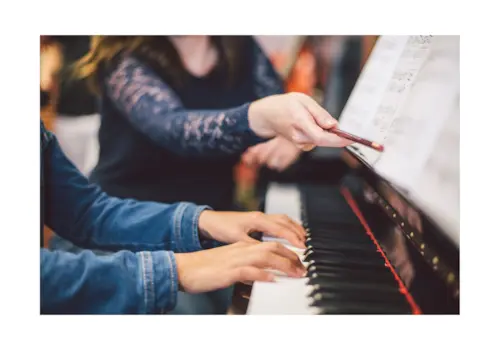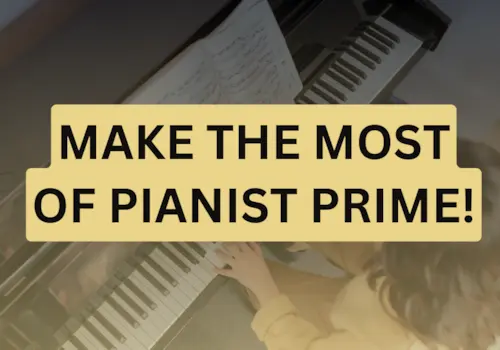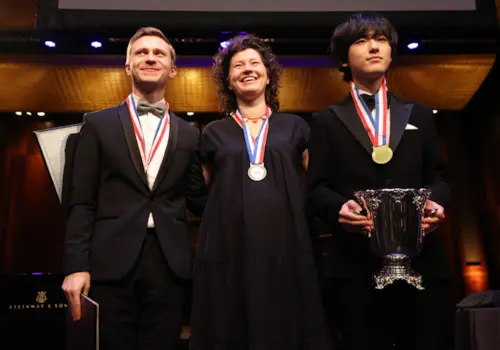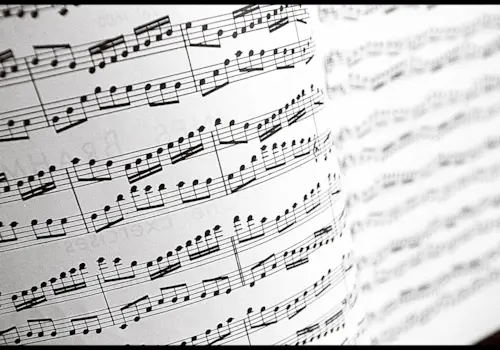Pianist talks to the composer about music, contests, and competitions in our Q&A
In the midst of a beautiful February day in Dubai, we arrived at the stunning Jumeirah Zabeel Saray Hotel on Dubai’s iconic Palm Jumeirah to find it swarming with musicians of every ilk and calibre. Orchestra professionals, esteemed maestros, and young virtuosos all mingled together around the luxurious Zabeel Theatre, as a wave of expectation and nervous anticipation filtered through the air.
The reason for all this excitement was the Classic Piano International Competition, an ambitious large-scale international event with a staggering prize fund of €250,000 that had taken over the entire theatre complex from the beginning of February. The contest was in the middle of its third round when we arrived, with the 70 candidates that had been invited to Dubai already being whittled down to just 18 star participants. For this third round, each of them were required to present two compulsory pieces, both performed alongside the Armenian State Symphony Orchestra – Mozart’s Piano Concerto No. 20, and the Suite for Piano and Orchestra No. 2 'From my Bookshelf', by Composer-in-Residence Alexey Shor and Mikhail Pletnev.
A renowned contemporary composer, this is not the first time that Mr Shor has taken the role of Composer-in-Residence at Classic Piano, and we sat down with him for an engaging conversation where we discussed his work, his inspirations, and much more:
It’s great to see a composition by a living composer as a concerto requirement at the 2024 Classic Piano International Competition. Can you tell us a bit about how this came about, and your relationship with Classic Piano, both for this year and for previous editions?
“Well, I think it is not unusual for the competition to have a piece by a modern composer. Classic Piano used one of my pieces last time and then they approached me and asked for another one this time, and that’s pretty much the whole story of it.”
‘From my Bookshelf’ is a collaborative work with Mikhail Pletnev. Could you tell us about your history with Mr Pletnev? When did you first meet, and what made you decide to collaborate with him for the 2021 version of ‘From my Bookshelf’?
“I had first written ‘From my Bookshelf’ in 2019. About two years later, in 2021 when Mr Pletnev was scheduled to perform here in Dubai, we met for the first time. Our meeting was a few days before the performance and he had several ideas about changes here and there which I was very open to. As a result of that collaboration, this new version of ‘From my Bookshelf’ came about. What he wanted to do, I believe, is to change it slightly to suit his taste. I am sure he made the piano part more comfortable to play, and that’s why, when Classic Piano came to ask me for a piece to contribute to the competition, I recommended the rearranged version as opposed to my original version because I am sure that Mr Pletnev made it very pianistic and comfortable.”

Classic Piano competitor Arina Antonosyan performs 'From my Bookshelf'
We believe that you also collaborated with him for the 2021 version of your First Piano Sonata? How did that happen? Was that before ‘From my Bookshelf’?
“No, that was after. He saw the score of my sonata, and asked me if I would be okay with him making some changes, and I was very happy to let him do so. His alterations made the sonata very different from the original version, and so now it exists in this form, with two authors.”
Most of your compositions have very atmospheric names, including, of course, ‘From my Bookshelf’. Can you tell us about the story or inspiration behind the piece?
“It all started from my kids really. I have relatively young kids, and when they started coming up to reading age, I began handing them works of literature. When I was doing this, all kinds of memories started coming back to me, of my own reading books from when I was a kid, and there was one image in particular that really struck me – it was a bookshelf that used to be right across from my bed. There was just this visual of a whole bunch of particular books standing on it stuck in my head, and that’s when the idea came to me to write a music piece that has characters from these books.”
Have they given you any feedback regarding the work after they listened to it?
“I don't know if they are very objective listeners! They like it, but they are my kids after all!”
What are you looking for in a pianist to make for a great performance of the piece? What qualities do you think they need?
“It's hard for me to say in absolute terms. I definitely appreciate good sound and I like a variety of sounds and a variety of emotions. And when I write my music, I try to give the performers an opportunity to demonstrate different moods and different emotions. There has to be some connection between the performer and the music, and you need to feel that.”

Competitor Yunfan Yang performs 'From my Bookshelf'
Would you ever be disappointed if one of your pieces performed wasn't up to your standard?
“Privately, I am sometimes disappointed, of course. It’s only natural really and it happens to all composers and with any piece of music. Sometimes, for instance, you hear people playing Mozart completely devoid of emotion, and obviously that doesn’t do justice to the work so there is an element of disappointment. And the same can happen with my own pieces as well.”
What are the technical challenges that present themselves to the pianist and the orchestra with regard to ‘From my Bookshelf’?
“Well, since ‘From my Bookshelf’ has literary characters who are all very different from one another, I think there are a lot of different moods in the piece and sometimes even within the same movement the moods are changing. Let’s take the character of Don Quixote, for instance. He's sort of a schizophrenic and capricious figure, ranging all the way from deep sadness to ecstatic energy. He is always somewhere between super romantic and militaristic and aggressive, and the music switches all the time. And I guess that's the challenge for the performers, and a pleasure for me.”
Do you think that the concert pianists of today are more open-minded to non-conventional concerto repertoire? We so often see the ‘usual’, popular concertos on programmes around the world. How open do you think they would be to contemporary work?
“Well, contemporary works do get played sometimes. I don't know if it's more or less now than in older times. In the past, if you go back by 70 or 80 years, some of the greatest composers of all time were still alive and they were definitely performed a lot. So people have clearly always been open to new music.”
I think we see that in all sorts of genres, like if you look at pop music or funk or jazz, I think we see it everywhere. So that's a very interesting way in which the world perceives music or art, do you think?
“I think people have an inherent need for something new. I think when people go to see a new work of art of any kind – music, theatre, visual art – they don't go there with the expectation that they're going to see the work of a new Leonardo da Vinci, but they still want to see something new.”
As a composer, what emotions or reactions do you hope to evoke from both the performers and the audience through your works?
“In the case of ‘From my Bookshelf’ in particular, I think the emotions are sort of built into the characters that are portrayed in the music. So I hope to see some connection between the performance and the characters, at least the way I perceive them.”
It is often said that music and mathematics go hand-in-hand. As a mathematician, what do you think?
“I'm not sure they go hand-in-hand as much as many people think. Bach was sort of obsessed with numbers, for instance, but I wouldn't call it mathematics. I would call it numerology. And I think most people think that there's a connection between math and music because of Bach. He encoded all kinds of things into his pieces. He wrote canons that can be played backwards and forwards, but I think that even if he had done none of those things, he would still be the greatest composer that ever lived.”
When you say numerology, do you think it also springs from certain patterns we as humans observe and are obsessed with it in a way that is slightly beyond the reality around us?
“People observe sort of simple symmetries and simple facts about numbers. And it's kind of fascinating in the course of regular life. But it's not science.”
Do you ever think such symmetries influence you when you compose pieces?
“Not consciously, no. Maybe because of my training in mathematics, I'm instinctively more attuned to certain symmetries. For instance, sometimes I write something and think that ‘Ah, something’s bothering me here’, and then I realise that, for example, I have two extra measures somewhere where ‘mathematically’, one would expect symmetry. But for the most part, I don't think in any mathematical terms when I write music.”
What is next on the composing agenda for you? Anything you’d like to share with us?
“Well, I've recently finished writing a pretty substantial piano concerto. I also wrote a concerto for violin and viola for two dear friends of mine. And now I'm mostly thinking about another violin concerto and also writing sketches for other things.”
For more information about the Classic Piano International Competition, make sure to visit the official website at classicpiano.eu
© Alexander Gusov (Main image)
© Dmytro Yeliseiev (competitors)







